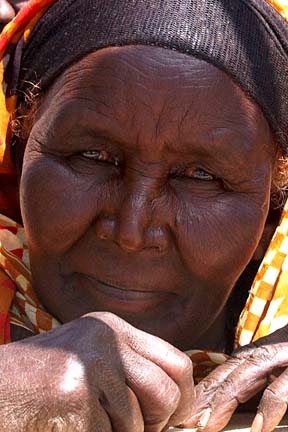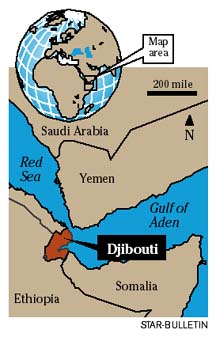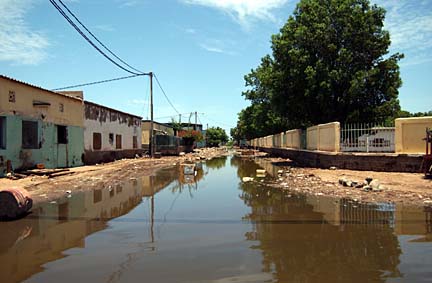
A woman waits for water provided by Marines, who are in Djibouti to provide flood relief and to fend off al-Qaida.
U.S. Marines bring hope
to a poor African nation
Djibouti, Horn of Africa >> A Jeep bus careens wildly around a corner and the side mirror whacks the head of a local man; he drops, apparently dead. Djiboutians take little notice. Life is cheap is this lawless land.
Maj. Tom Prentice, a Marine from Texas, calls Djibouti "the kind of place where you'd expect to see Indiana Jones." This former French colony, contiguous with Ethiopia and Somali, is in a tough neighborhood. According to the Marine Corps commanding officer Col. Bill Callahan, an Irishman from West Hartford, Conn., the primary values are location, location and location.
Djibouti (ja-BOOT-ti) is on the Horn of Africa, at the crossroads of the Red Sea, Yemen, Somalia, Kenya, Ethiopia and of course Arabia's rich oil fields. It is slightly smaller than Massachusetts, with a population of 600,000 mostly Muslim Africans. It has virtually a zero economy, little potable water and the life expectancy for a Djiboutian born today is barely 40 years. This sorrowful statistic is no doubt well assisted by the AIDS epidemic that scientists believe originated in Africa; sadly, 12 percent of Djiboutians now have HIV. One of the Djiboutians' few recreations is a stimulant called "khat," which they get from chewing the leaves of the catha edulis plant.
Each day at 1300 the Marines see the cargo plane from Ethiopia land with the daily khat sales to be distributed through a legally organized set of vendors. Khat is widely used even at the highest circles of government.
Travel here is at your own risk. The roads have no signage, even at railway crossings. Livestock wander onto the highways. Vehicles, free of safety measures, often seem to be out of control.
Terrorists will thrive in these lands without governance. America had to learn this the hard way. Where we failed to stop Osama bin Laden in Ethiopia and Afghanistan, we now intend to stop al-Qaida from establishing a base on or near the Horn of Africa. Thus enter the Marines, who now have satellite bases on Kenya's coast and in Ethiopia, operated from Djibouti as part of Operation Enduring Freedom.
The Marines also provide humanitarian relief, which currently includes building whatever structures were destroyed and purifying water tainted by recent flooding in the normally arid region.
This is a hardship post for the Corps; usually no more than a six-month deployment is required. This small base is reminiscent of the old posts in Latin America, where Marines often represented the only semblance of law and order.
During the Gulf War, Djibouti was the base of operations for French forces, and France still maintains a garrison of the renowned French Foreign Legion (see story on this page). President Omar Gelleh is a strong ruler who favors Djibouti's long-standing relationship with France. He also favors the economic assets the United States offers his country. The Germans also have some forces in Djibouti. Perhaps France and Germany, too, would have been targets in Djibouti land, had their governments not vetoed the U.S. resolutions at the United Nations.
This the third point in the AOR triangle (area of responsibility). Our Marine general officers Lt. Gen. Chip Gregson and Brig. Gen. Jerry McAbee from Oahu have the responsibility for this, as well as the Iraqi and Afghanistan areas.
Meanwhile, our Marines stand guard at a post in a critical location in the global war on terrorism. Be assured, says Col. Callahan, this will not be a future home for al-Qaida.
BACK TO TOP |
The U.S. Marines and the French Foreign Legion are working together to bring relief to Djibouti, a normally arid African nation hit hard recently with storms and the ensuing flooding.
Elite French fighters
join MarinesThe famed French Foreign
Legion aids relief work in Africa
Djibouti, Horn of Africa >>
"If you turn me down once more, I'll join the French Foreign Legion.
"Au revoir, cherie
"It's the French Foreign Legion for me ..."This Frank Sinatra ballad laments going off to join the French Foreign Legion after your girl turns you down. Well, men from 120 countries have done just that, although perhaps not all for that reason. The legendary Legion Etrangere are 7,500 strong. Seventy percent of the enlisted are not French, but 90 percent of the officers are. Lt. Col. Benoit Durieux, graduate of Saint Cyr Academy in Brittany, gave us some of the famed Legion's history.
Only one out of every eight men who try to enlist makes the grade. Many are given new identities for protection. After five years, the term of enlistment, they are eligible for French citizenship. They train four months in Castelnaudary, and of course one of the subjects is teaching all those men from different countries how to speak French.
Clearly not for the faint-hearted, the Legion stands out among elite fighting organizations. It generates more mystery and romance than any other unit worldwide. Legionnaires are part of the French Army but are known by their distinctive Seven Flame Grenade insignia.
Legion regulations would raise the eyes even of our disciplined Marines:
>> Legionnaires using assumed identities are not allowed to have bank accounts.Recently a rare and devastating rainfall and subsequent flooding killed scores of Djiboutians and displaced hundreds out of their meager homes. The Legionnaires are repairing the homes and other damage done by the storm, side by side with Marines who are operating a reverse-osmosis water purification unit that converts nonpotable water to potable at the rate of 600 gallons an hour.
>>A Legionnaire cannot own a motor vehicle or marry until meeting several conditions, including being enlisted at least five years and using his own identity.
>> They must live in barracks and are not permitted to wear civilian clothes during the first five years.
>> Should they return late from liberty, they will receive 10 days in prison.
>> They must not leave France until they have been in the Legion for three years.All these Marine Corps assignments fall under the combined authority of Marine Forces Pacific/Marine Central Command of Lt. Gen. Chip Gregson and Brig. Gen. Jerry McAbee, based on Oahu. Between the United States Marines and the Legionnaires in Djibouti, they well live up to the Legion's version of Semper fidelis:
"Honneur et Fidelite."
P.T. Brent is a Hawaii businessman and a former Marine who has been traveling with U.S. troops supporting Operation Enduring Freedom.


